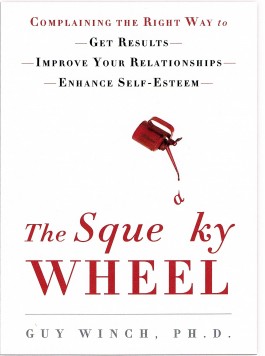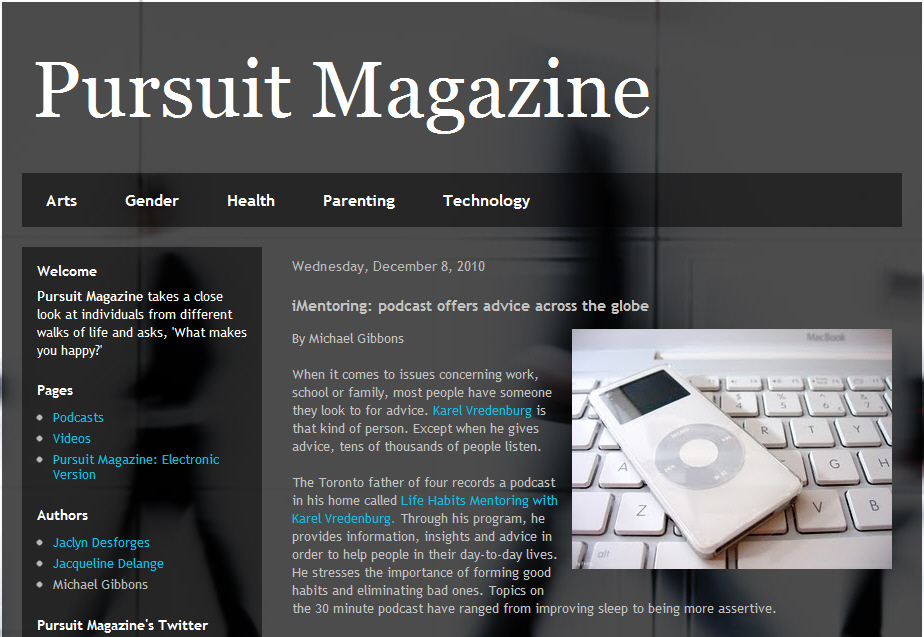Top 10 Life Habits Podcast Episodes
I've been reflecting on all the top ten this and top ten that I've seen on blogs and the social networks toward the end of the year. That got me thinking about what the top ten Life Habits podcast episodes would be. I had a look and aggregated the results from several of the top countries and found some pretty interesting results. They reflect the top ten episodes being listened to right now. The list may also be interesting to you if you haven't listened to the full 67 episodes produced to date and would like to listen to ones that other listeners are particularly interested in. This list may also be of interest to people who just got a device for Christmas and want to get into podcast listening too.
So, here's the list (the numbers in parentheses indicate the episode number):
- Types of Help (LH67)
- Assertiveness (LH49)
- Managing Stress (LH24)
- Visualizing Progress (LH64)
- 5 Lazy Ways to Get in Shape (LH66)
- Life Lessons (LH65)
- Stop Procrastinating (LH46)
- Time Management (LH2)
- Staying Positive (LH3)
- The Power of the Mind (LH4)
Many podcasts that deal with news or technology developments are time sensitive and listeners typically only listen to the most recent episode and past episodes have very little value because they're essentially old news. In contrast, my Life Habits episodes are essentially timeless and people regularly listen to the full list of epsides. Many listeners subscribe and listen to every episode as it comes out but others selectly listen to podcast topics that specifically interest them.
The most listened to episode right now is the most recent one that I did with UK Psychologist Mandy Kloppers.  In addition to being the most recent, it is a topic that I would think would be of particular interest to many of the listeners and Mandy also does a really good job of outlining the types of situations and challenges that would be appropriate for which to seek some professional help, the types of help that are available, and also what to expect and how to get the most out of the various types of professional help. Many people also have difficulty being appropriately assertive so that comes in as the second more popular episode. The session provides information on how to avoid being to unassertive but also very importantly to avoid being too aggressive too. We live in a rather stressful world so managing stress comes in at position three. Visualization of your goals and visualizing progress toward them is important and the episode on that topic came in at position four. The session with my regular guest Marie-Josée Shar on five lazy ways to get into shape is especially of interest at the moment when many people have resolved to get into better shape so this episode came in at position five. Steve Jobs's life lessons came in at the sixth position. The common challenges of procrastination, time management, and staying positive took positions seven, eight, and nine. The tenth slot was taken by my session on the power of the mind during which I describe the various biases we have and often don't know we have. If you'd like to check out these episodes, you can do so by going to the podcast page on iTunes or the show notes site.
In addition to being the most recent, it is a topic that I would think would be of particular interest to many of the listeners and Mandy also does a really good job of outlining the types of situations and challenges that would be appropriate for which to seek some professional help, the types of help that are available, and also what to expect and how to get the most out of the various types of professional help. Many people also have difficulty being appropriately assertive so that comes in as the second more popular episode. The session provides information on how to avoid being to unassertive but also very importantly to avoid being too aggressive too. We live in a rather stressful world so managing stress comes in at position three. Visualization of your goals and visualizing progress toward them is important and the episode on that topic came in at position four. The session with my regular guest Marie-Josée Shar on five lazy ways to get into shape is especially of interest at the moment when many people have resolved to get into better shape so this episode came in at position five. Steve Jobs's life lessons came in at the sixth position. The common challenges of procrastination, time management, and staying positive took positions seven, eight, and nine. The tenth slot was taken by my session on the power of the mind during which I describe the various biases we have and often don't know we have. If you'd like to check out these episodes, you can do so by going to the podcast page on iTunes or the show notes site.
Twitter and "The Squeaky Wheel"
Twitter is great for connecting people and ideas. I've described my Twitter versus Facebook experiment on this blog previously which showed that Facebook was far superior in terms of the degree of interaction and engagement compared with Twitter. However, I'm finding benefits that are unique to Twitter. While Facebook is good for reconnecting with old friends, I'm finding a particularly valuable benefit of Twitter is meeting interesting new people and engaging with them. A case in point is Dr. Guy Winch and his book "The Squeaky Wheel: Complaining the right way to get results, improve your relationships, and enhance self-esteem". Guy followed up on a Tweet I sent out about a Life Habits podcast episode which led to a DM discussion about his book. He subsequently sent me the book. I read it, loved it, and suggested to Guy that he be a guest on my podcast. We just did that podcast together with Guy providing some insightful quotes about complaining effectively and going through a top 10 list of the essence of the material in his book. The advice he gave in the podcast is practical and extremely valuable if you only listened to the podcast and took action on his advice during it. Of course, you'll get even more value if you buy and read his book. You can listen to the podcast episode via iTunes, on the shownotes site, or you can discuss it on the new Facebook page. You can also visit Guy's site to learn more about him and how to get hold of his book.
this blog previously which showed that Facebook was far superior in terms of the degree of interaction and engagement compared with Twitter. However, I'm finding benefits that are unique to Twitter. While Facebook is good for reconnecting with old friends, I'm finding a particularly valuable benefit of Twitter is meeting interesting new people and engaging with them. A case in point is Dr. Guy Winch and his book "The Squeaky Wheel: Complaining the right way to get results, improve your relationships, and enhance self-esteem". Guy followed up on a Tweet I sent out about a Life Habits podcast episode which led to a DM discussion about his book. He subsequently sent me the book. I read it, loved it, and suggested to Guy that he be a guest on my podcast. We just did that podcast together with Guy providing some insightful quotes about complaining effectively and going through a top 10 list of the essence of the material in his book. The advice he gave in the podcast is practical and extremely valuable if you only listened to the podcast and took action on his advice during it. Of course, you'll get even more value if you buy and read his book. You can listen to the podcast episode via iTunes, on the shownotes site, or you can discuss it on the new Facebook page. You can also visit Guy's site to learn more about him and how to get hold of his book.
iMentoring: Technology-Enabled Self-Improvement
I was interviewed recently for an article in Pursuit Magazine about my Life Habits podcast series. That piece and a comment from a listener that I read in the Australian iTunes store got me thinking about the changes taking place in the ways in which people can go about improving themselves. In the not so distant past, the options you had for getting help for improving yourself were limited to finding and then visiting with a personal life coach or mentor (often a Psychologist in private practice), buying a book on a subject that you wanted to improve upon, or sending for CDs or audio tapes that you learned about from ads in magazines or on television. While these types of self-improvement still exist and can be quite useful, people aren't limited to only these for-fee options. People can now use their Smartphone or iPod type portable audio player to find and play thousands of podcasts on a wide variety of self-improvement topics. Listener Toni in Australia points out a key benefit of podcasts like mine, "...you get the feeling that he is your own personal coach/mentor." Despite using a fairly impersonal communication mechanism, listening to podcasts particularly when using headphones can often give the listener an intimate connection to the person on the podcast which has the effect of reinforcing the messages being given and making them more personal. In addition, the podcasts are free, come out with a new episode on a regular basis, and the best of them encourage two-way communication and a feeling of community.
and a comment from a listener that I read in the Australian iTunes store got me thinking about the changes taking place in the ways in which people can go about improving themselves. In the not so distant past, the options you had for getting help for improving yourself were limited to finding and then visiting with a personal life coach or mentor (often a Psychologist in private practice), buying a book on a subject that you wanted to improve upon, or sending for CDs or audio tapes that you learned about from ads in magazines or on television. While these types of self-improvement still exist and can be quite useful, people aren't limited to only these for-fee options. People can now use their Smartphone or iPod type portable audio player to find and play thousands of podcasts on a wide variety of self-improvement topics. Listener Toni in Australia points out a key benefit of podcasts like mine, "...you get the feeling that he is your own personal coach/mentor." Despite using a fairly impersonal communication mechanism, listening to podcasts particularly when using headphones can often give the listener an intimate connection to the person on the podcast which has the effect of reinforcing the messages being given and making them more personal. In addition, the podcasts are free, come out with a new episode on a regular basis, and the best of them encourage two-way communication and a feeling of community.
A lot of people can be helped world-wide using podcasts. My own is popular in the major English speaking countries like the US, Canada, Australia, and the UK but increasingly it is also on the top 10 list of podcasts in countries like India and Singapore. Electronic delivery of mp3 files via iTunes makes all of this possible. It is quite phenomenal the increase in reach that these technologies afford and, in turn, the ability to have huge populations of listeners glean the benefits of these programs.
Of course, not all improvement can be self-improvement.  Mandy KloppersCertain problems still require one-on-one attention from a professional. In the case of my podcast, I only provide the podcast material myself but I regularly invite guests to join me on particular episodes to address topics on which they are experts. Those guests thus far have been professionals who also provide individual counselling in their offices as well as technology-mediated sessions. UK Psychologist Mandy Kloppers does it all. She runs Mandy Jane - Life Design and has consulting rooms in Woking, Surrey, UK, but also provides counseling by phone, email, text, and Skype. She specializes in personal relationships, depression, anxiety, and self-improvement/personal development. US-based Marie-Josée Shaar runs Smarts and Stamina which is dedicated to providing "accessible, high-quality, scientifically-based healthy mind, body, and productivity information" to help "cultivate
Mandy KloppersCertain problems still require one-on-one attention from a professional. In the case of my podcast, I only provide the podcast material myself but I regularly invite guests to join me on particular episodes to address topics on which they are experts. Those guests thus far have been professionals who also provide individual counselling in their offices as well as technology-mediated sessions. UK Psychologist Mandy Kloppers does it all. She runs Mandy Jane - Life Design and has consulting rooms in Woking, Surrey, UK, but also provides counseling by phone, email, text, and Skype. She specializes in personal relationships, depression, anxiety, and self-improvement/personal development. US-based Marie-Josée Shaar runs Smarts and Stamina which is dedicated to providing "accessible, high-quality, scientifically-based healthy mind, body, and productivity information" to help "cultivate Marie-Josée Shaar a positive work environment that promotes productivity, engagement, and innovation" by empowering clients "to make their best, most significant contributions everyday at work, at home, and in the world". Marie-Josée provides training to companies, counseling to individuals. and writes a great short newsletter.
Marie-Josée Shaar a positive work environment that promotes productivity, engagement, and innovation" by empowering clients "to make their best, most significant contributions everyday at work, at home, and in the world". Marie-Josée provides training to companies, counseling to individuals. and writes a great short newsletter. 
To participate in this iMentoring experience you simply need to subscribe to the Life Habits podcast within iTunes or go to the shownotes site. Recent episodes have included ones on taking things too personally and improving sleep. The latter episode was with Marie-Josée, and new episodes with Mandy and with Kathryn will be recorded very soon. Of course, don't limit yourself to my Life Habits podcast series, I'd suggest you check out the other fine self-improvement podcasts that are available as well and enjoy iMentoring.
